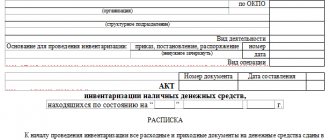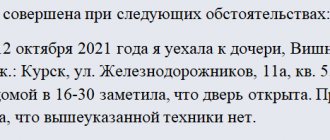When to prepare an appeal
The victim is not obliged to deal with the qualification of the act; this is the job of law enforcement agencies and the court. Very often, applicants do not even know the exact circumstances of what happened, but see only the result, the loss of property. It is not necessary to draw up an appeal specifically regarding the fact of robbery or robbery; it is enough to declare facts that have signs of a crime. Law enforcement officials will investigate them and decide whether to initiate a case.
Therefore, an appeal for theft (this is a general name for such sometimes difficult to distinguish crimes as robbery, theft, fraud) is filed by an individual or legal entity in any case when property belonging to them is in any way appropriated by other persons who do not have any rights to these things .
Possible consequences of filing an application
The statement of the injured person is the basis for opening criminal proceedings under Article 158 of the Criminal Code of the Russian Federation. The exception is for offenses with minor damage, for the commission of which the law provides for administrative liability.
Important! The insignificance of a criminal act is an assessment indicator that depends on the financial condition of the person affected by the theft. That is, the same amount may represent significant damage for one person, but minor damage for another.
In order for theft to be considered in criminal proceedings, it is necessary to prove that the stolen property was of great importance to the victim. There are frequent cases when law enforcement officials try to dissuade a theft victim from filing a report, convincing her that the damage caused is negligible, in particular, because “the phone was old,” “the coat was worn,” etc. However, you should not succumb to this, deliberately depriving yourself of the opportunity to return the property.
Additional Information! According to the results of prosecutorial checks, every fourth decision to refuse to open criminal proceedings due to minor damage caused by theft is considered illegal.
Where and when to submit it?
The Code of Criminal Procedure of the Russian Federation describes in detail the rules by which a complaint about theft is filed with the police, but the deadline for filing a complaint is not established. That is, the submission deadline is not limited by time. The victim should take into account that there are statutes of limitations for criminal prosecution and they are according to Art. 78 of the Criminal Code of the Russian Federation for two years when committing crimes of minor gravity (almost all household thefts fall into this category).
Thefts and thefts specifically (theft means the removal of things secretly for the criminal) are dealt with by investigators and police investigators. The investigation is carried out in accordance with Art. 152 of the Code of Criminal Procedure of the Russian Federation, by employees of the department at the place where the act was committed. The victim has the right to apply at his place of residence, but the materials will still be sent to the right department.
What to do if money is stolen from your card via the Internet?
In accordance with the current legislation of the Russian Federation, the bank is obliged to return the money to the cardholder if:
- the holder did not violate the rules for safe use of the card;
- the cardholder informed the bank about the unauthorized transaction as soon as possible (no more than one day from the date of receipt of the transaction notification from the bank).
It should be understood that it is impossible to cancel the operation itself, but it is possible to return the funds withdrawn from the account. To do this you need:
- If you discover theft of funds from a bank card, immediately report the theft to the bank and request that the card be blocked . You can block the card yourself via the Internet system or mobile application. Sometimes this is faster than calling a call center operator. However, it is still necessary to report the incident to the contact line operator.
- immediately after calling the bank, immediately report the theft to the police by phone 02. This will record the fact that the owner of the bank card has contacted you and will complicate the attempts of unscrupulous police officers to illegally deny you the right to file a statement about the crime committed.
- no later than the next day after receiving a notification from the bank about debiting funds from the account, come to the bank branch and submit a written statement about the theft of funds from the card and blocking the account. This will increase the likelihood of successful return of funds to the victim’s account.
What to write in it
The law allows victims to contact law enforcement officials:
- orally (handling of facts about a crime is recorded in the protocol), even outside the buildings of police departments;
- by mail;
- by email;
- through special services (they are posted on official websites with detailed explanations);
- personally.
Practice shows that personal appeals are still the most effective.
What to include in a document, how to write a statement of theft to the police:
- in the upper right corner - the name of the department where the applicant is applying;
- the header contains the applicant’s data with the address of actual residence and telephone number for operational contacts;
- then in the center of the sheet is the name of the document (it is not necessary to indicate what crime occurred, it is permissible to give the general name - theft or simply write “statement”);
- then follows a description of the events, only the basic facts; law enforcement officers will definitely take a separate description of the act with a detailed description of what happened;
- property with a clear description, reference to cost;
- a request to initiate a criminal case;
- description of applications;
- message informing of liability for false denunciation. This is a mandatory requirement;
- personal signature, date of compilation.
Help from a lawyer in case of money theft
Thus, the current legislation provides the victim with broad powers to return stolen funds, but certain gaps still remain. In this regard, it would be wise to seek help from our lawyer, who:
- will take upon himself the protection of your interests at all stages of the case;
- will submit a written statement about the incident to law enforcement agencies (for more information about the application to initiate a criminal case for fraud, follow the link), bank, insurance company;
- will challenge the slightest violations of the norms of the criminal procedure code and the actions of the investigator;
- collect the required evidence;
- will draw up and file a civil claim in a criminal case if the culprit has not been found;
- will receive a copy of the writ of execution and will appeal against the actions or inaction of the bailiff.
You can contact our lawyer at any stage of the case, but the sooner you do this, the better!!!
Samples
This is what a sample statement to the police about the theft of a phone looks like, drawn up according to all the rules.
| Department No. 5, Regional Ministry of Internal Affairs of Russia for the city of Kurgan Kurgan, st. M. Gorky, 39 from Annenkova Anna Andreevna: 640000, Kurgan, st. Dekabristov, 2-2 contact phone number: 8-920-777-77-77 Statement of theft of property I ask you to initiate a criminal case on the grounds of a crime, to bring to justice a person unknown to me, who on August 05, 2020, in the period from 15.00 to 17.00, stole my Fly brand cell phone from the pocket of my bag in a store at the address: Kurgan, st. Pushkina, 20 (Metropolis store). The loss was discovered when leaving the store at 17.00. The cost of the phone is 20,000 rubles, I have attached a copy of the receipt and warranty card for its purchase on 08/01/2020. The number the phone was used with was 8-909-666-66-66. On liability for knowingly false denunciation under Art. 306 of the Criminal Code of the Russian Federation I know. Application: A copy of the receipt, warranty card. "__"__________ 2021 ______________Annenkova A.A. |
And this is a sample statement to the police about the theft of money.
Basic information
If property is stolen, you must immediately contact the police - either to the nearest department, or to the address of the premises from which the items were stolen. The sooner you seek help, the higher the likelihood of finding the culprit. However, you can go to the police even if the crime became known after a few days.
Incident reporting can be written or oral. In the second case, the person on duty will record the application using a special acceptance form.
Theft entails the initiation of a criminal case, with the exception of petty theft - for the latter, the perpetrator faces punishment under the Code of Administrative Offenses of the Russian Federation. The application must be registered, and the applicant is issued a coupon confirming this fact. The notification coupon contains the date of receipt of the application, information about the police department, stamp and signature of the authorized person.
After registration, over the next 3 days, employees will take measures to establish the identity of the criminal, after which a criminal case will be initiated or a refusal to initiate it will follow.
The police have no right to refuse to accept an application. It does not matter what time of day the victim applied, whether there are unemployed workers, what is the content of the application, what is the amount of material damage, whether a criminal case will be initiated, etc. But if the employee claims that there are errors in the text of the application, it is recommended to correct them.
If the application is refused, the victim must send a complaint to the prosecutor's office, indicating the full name of the employee and the circumstances under which the application was rejected. The employee will face disciplinary action.
Adviсe
Protecting your property from theft is quite difficult. Criminals use various theft schemes and modern tools to commit them. However, following a number of preventative measures will significantly reduce your risks.
Bicycle theft occurs when you leave it unattended, even for a short time. Accordingly, a system of additional protection should be considered. Make sure that the lock on your bike is in good working order and that the structure to which it is “attached” is stable. Do not use common cheap types of locks and interlocks, because... the criminal may have the keys to them.
Do not leave your bike for a long time in an unsecured place. If you do not have the opportunity to park it, try to find outdoor video surveillance cameras in the field of view of which your vehicle will be.
Theft remains a popular form of theft. Due to the large number of such statements, law enforcement agencies do not always respond promptly to incidents. However, a proper complaint should be filed with the police to initiate investigations. To help the investigation, use all available methods to search for the bicycle yourself.
How to write a statement to the police about the theft of scrap metal?
Hello. How to write a petition to the investigator under Art. 158 part 1? Scrap metal was stolen, it is not worth it on the balance sheet! How to justify?
Lawyer Lebedev Z.S.
Good afternoon According to Articles 140, 141, 144 of the Criminal Procedure Code, the reasons for initiating a criminal case are: 1) statement of a crime; 2) surrender; 3) a message about a crime committed or being prepared, received from other sources; 4) the prosecutor’s decision to forward the relevant materials to the preliminary investigation body to resolve the issue of criminal prosecution. The reason for initiating a criminal case for crimes under Article 172.1 of the Criminal Code of the Russian Federation is only those materials that are sent by the Central Bank of the Russian Federation in accordance with the Federal Law of July 10, 2002 N 86-FZ “On the Central Bank of the Russian Federation (Bank of Russia )”, as well as the bankruptcy trustee (liquidator) of a financial organization to resolve the issue of initiating a criminal case. The basis for initiating a criminal case is the presence of sufficient data indicating signs of a crime. Reporting a crime can be made orally or in writing. A written statement of a crime must be signed by the complainant. An oral statement about a crime is entered into a protocol, which is signed by the applicant and the person who accepted the statement. The protocol must contain information about the applicant, as well as documents identifying the applicant. If an oral report of a crime is made during an investigative action or during a trial, it is entered, respectively, in the protocol of the investigative action or the protocol of the court session. In the event that the applicant cannot be personally present when the protocol is drawn up, his application is drawn up in the manner established by Article 143 of this Code. The applicant is warned of criminal liability for knowingly false denunciation in accordance with Article 306 of the Criminal Code of the Russian Federation, about which a note is made in the protocol, which is certified by the signature of the applicant. An anonymous report of a crime cannot serve as a basis for initiating a criminal case. A confession is a voluntary statement by a person about the crime he has committed. A statement of confession can be made either in writing or orally. An oral statement is accepted and entered into the protocol in the manner established by part three of Article 141 of this Code. A message about a crime committed or being prepared, received from sources other than those specified in Articles 141 and 142 of this Code, is accepted by the person who received this message, and a report on the discovery of signs of a crime is drawn up. Federal Law No. 87-FZ of June 5, 2007 introduced amendments to Article 144 of this Code, which come into force 90 days after the date of official publication of the said Federal Law. any committed or impending crime and, within the competence established by this Code, make a decision on it no later than 3 days from the date of receipt of the specified message. When checking a report of a crime, the inquiry officer, the inquiry body, the investigator, the head of the investigative body has the right to receive explanations, samples for comparative research, request documents and objects, seize them in the manner established by this Code, order a forensic examination, take part in its production and obtain a conclusion expert within a reasonable time, carry out an inspection of the scene of the incident, documents, objects, corpses, examination, demand documentary checks, audits, studies of documents, objects, corpses, involve specialists in these actions, give the body of inquiry a binding written order to carry out operational search activities. Persons participating in the production of procedural actions when checking a report of a crime are explained their rights and obligations provided for by this Code, and are provided with the opportunity to exercise these rights to the extent that the procedural actions performed and procedural decisions made affect their interests, including the rights not testify against yourself, your spouse and other close relatives, the circle of whom is defined in paragraph 4 of Article 5 of this Code, use the services of a lawyer, and also file complaints against the actions (inaction) and decisions of the investigator, the head of the inquiry unit, the head of the agency inquiry, inquiry body, investigator, head of the investigative body in the manner established by Chapter 16 of this Code. Participants in the verification of a crime report may be warned about the non-disclosure of data from pre-trial proceedings in the manner established by Article 161 of this Code. If necessary, the safety of a participant in pre-trial proceedings is ensured in the manner established by part nine of Article 166 of this Code, including when receiving a report of a crime. Information obtained during the verification of a crime report may be used as evidence, subject to the provisions of Articles 75 and 89 of this Code. If, after the initiation of a criminal case, the defense or the victim submit a request for an additional or repeated forensic examination, then such a request must be granted. According to a report of a crime disseminated in the media, the inspection is carried out on behalf of the prosecutor by the inquiry body, as well as on behalf of the head of the investigative body by the investigator. The editorial office and the editor-in-chief of the relevant mass media are obliged to hand over, at the request of the prosecutor, investigator or body of inquiry, the documents and materials at the disposal of the relevant mass media confirming the report of a crime, as well as information about the person who provided the specified information, except in cases where this the person set a condition to keep the source of information secret. The head of the investigative body, the head of the inquiry body has the right, at the motivated request of the investigator or interrogating officer, respectively, to extend the period established by part one of this article to 10 days. If it is necessary to carry out documentary checks, audits, forensic examinations, studies of documents, objects, corpses, as well as conduct operational search activities, the head of the investigative body at the request of the investigator, and the prosecutor at the request of the investigator, has the right to extend this period to 30 days with mandatory indication of specific, the actual circumstances that served as the basis for such an extension. The applicant is issued a document confirming the acceptance of a crime report indicating information about the person who received it, as well as the date and time of its acceptance. A refusal to accept a report of a crime may be appealed to the prosecutor or to the court in the manner established by Articles 124 and 125 of this Code. The application of the victim or his legal representative in criminal cases of private prosecution, submitted to the court, is considered by the judge in accordance with Article 318 of this Code. In the cases provided for in part four of Article 147 of this Code, verification of a crime report is carried out in accordance with the rules established by this article. When a message about crimes under Articles 198 - 199.1 of the Criminal Code of the Russian Federation is received from the body of inquiry, the investigator, in the absence of grounds for refusing to initiate a criminal case, within no later than three days from the date of receipt of such a message, sends it to a higher tax authority in relation to the tax authority with which the taxpayer is registered with the tax authorities (tax agent, fee payer, insurance premium payer), or upon receipt of a message from the inquiry body about crimes provided for in Articles 199.3 and 199.4 of the Criminal Code of the Russian Federation - to the territorial body of the insurer in which they are registered registration of an insured - an individual or an insured organization who is obliged to pay insurance premiums for compulsory social insurance against accidents at work and occupational diseases to a state extra-budgetary fund (hereinafter in this article - the insured), a copy of such a message with the attachment of relevant documents and a preliminary calculation the estimated amount of arrears on taxes, fees and (or) insurance premiums. Based on the results of consideration of the materials sent by the investigator in the manner established by part seven of this article, the tax authority or the territorial body of the insurer, no later than 15 days from the date of receipt of such materials: 1) sends to the investigator a conclusion on violation of the legislation of the Russian Federation on taxes and fees and ( or) the legislation of the Russian Federation on compulsory social insurance against industrial accidents and occupational diseases and on the correctness of the preliminary calculation of the amount of the expected arrears of taxes, fees and (or) insurance contributions in the event that the circumstances specified in the report of the crime were the subject of research when conducting a previously appointed tax audit or checking the correctness of calculation, timeliness and completeness of payment (transfer) of insurance contributions for compulsory social insurance against industrial accidents and occupational diseases, as a result of which a decision of the tax authority or territorial body of the insurer has entered into force, as well as information about appealing or suspending the execution of such a decision; 2) informs the investigator that a tax audit or verification of the correctness of calculation, timeliness and completeness of payment (transfer) of insurance contributions for compulsory social insurance against industrial accidents is being carried out in relation to the taxpayer (tax agent, fee payer, insurance premium payer) or the insurer and occupational diseases, based on the results of which a decision has not yet been made or has not entered into legal force; 3) informs the investigator about the absence of information about a violation of the legislation of the Russian Federation on taxes and fees and (or) the legislation of the Russian Federation on compulsory social insurance against industrial accidents and occupational diseases if the circumstances specified in the report of the crime were not the subject of investigation when conducting a tax audit or checking the correctness of calculation, timeliness and completeness of payment (transfer) of insurance contributions for compulsory social insurance against industrial accidents and occupational diseases. After receiving the conclusion of the tax authority or the territorial body of the insurer, but no later than 30 days from the receipt of the report of the crime, based on the results of consideration of this conclusion by the investigator, a procedural decision must be made. A criminal case for crimes provided for in Articles 198 - 199.1, 199.3, 199.4 of the Criminal Code of the Russian Federation may be initiated by the investigator before receiving from the tax authority or territorial body of the insurer the conclusion or information provided for in part eight of this article, if there is a reason and sufficient data indicating for signs of a crime. Thus, a crime can be reported either orally or in writing. When submitting an application in writing, it must indicate the name of the body to which the application was submitted, the message itself, the full name and contact information of the applicant, the date of filing and the signature of the applicant.
Sincerely, lawyer Zakhar Lebedev, partner of the law firm Antonov and Partners.
Still have questions for your lawyer? Ask them right now here, or call us by phone in Moscow +7 (499) 288-34-32 or in Samara +7 (846) 212-99-71 (24 hours a day), or come to our office for a consultation (by pre-registration)!
What awaits a caught thief?
Punishments for theft are described in Article 158 of the Criminal Code (CC) of the Russian Federation. If the crime does not have qualifying characteristics, then the thief can be punished as follows:
- a fine of up to RUB 80,000.0;
- compulsory work up to 360 hours;
- correctional - up to a year;
- forced - up to two years;
- arrest for four months;
- imprisonment or restriction of freedom for up to two years.
For information: the maximum punishment for theft is imprisonment for a period of up to ten years and a fine of up to a million rubles. This is due for acts committed:
- organized group;
- in a particularly large amount (from 1 million rubles).
The found phone will be returned to the owner. If it is lost irretrievably, the victim can file a civil claim for compensation for damage as part of the judicial review of the theft case.
Download for viewing and printing:
Article 158 of the Criminal Code of the Russian Federation “Theft”
Video about Article 158 of the Criminal Code of the Russian Federation
Theft prevention
To avoid becoming a victim of theft, the owner of a mobile phone must independently take preventive steps. They are:
- do not hand over the device to strangers who request an urgent connection for any reason;
- at night it is better to switch the mechanism to vibration mode so that the sounds do not attract thieves and robbers;
- in public transport it is better to put the phone in the inner pockets of a bag or clothing;
- do not leave the device unattended in cafes, bars, restaurants;
- hide away while shopping;
- conduct preventive conversations on this issue with minors.
For information: responsibility for theft begins at the age of 14.
Minor thieves are also punished for such an act. Similar articles
- The rights of the accused and suspect in criminal proceedings: everything you need to know!
- Responsibility for violation of labor safety rules and regulations
- Rights of an administrative offender: everything you need to know!
- Theft of driver's license and car documents
How to properly write a missing person's notice, and where to place it?
You shouldn’t rely solely on law enforcement agencies. This does not mean that you should personally go after the culprit. It is enough to take all possible actions to disseminate information about the theft. You have the right to post information in any publicly available sources. Most often, victims post advertisements around the city asking for a reward to provide information that will help them find the bicycle. You can place advertisements in newspapers, local radio and television. Of course, these options require payment for the provision of services.
Note!
The most effective way is to post information on the Internet. Modern social networks have all the tools to quickly find the required data or distribute it. A request for help posted online allows you to quickly notify a small locality about the actions of an attacker.
On a voluntary basis, citizens unite in search groups that inspect the basements of houses and surrounding areas as the most popular places for storing bicycles. The point of such events is that the more people know about the problem, the more difficult it is for the criminal to get rid of the vehicle and remain unnoticed.
How to collect evidence for the theft of a bicycle?
It should be remembered that the circumstances specified in the statement of bicycle theft will be verified even in the absence of direct evidence of the crime. Your initial task is to provide the investigation with complete information about the event:
- place;
- approximate time;
- suspects (if any);
- circumstances that contributed to the theft (the bicycle was not fastened, the lock was faulty).
Be sure to provide the vehicle model and technical specifications. Of particular importance are the distinctive features that can be used to identify your particular bike (stickers, upgraded parts, faults).
Note!
If you still have the purchase receipt, provide it to the investigator. This document will not only confirm the ownership of the vehicle, but will also help the police determine the amount of damage you have suffered in monetary terms.
Most often, the theft of such things occurs on the street in crowded places, so the police cannot always collect all the material evidence in a timely manner. It is impossible to plan the perfect crime. Sometimes attackers forget their documents or other things that make them quite easy to identify.









